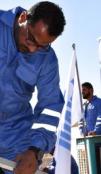Support to Energy Sector Reform in Iraq
|
Iraq holds one of the largest hydrocarbon resource endowments in the Middle East. Its challenge lies in unlocking this resource and its wealth-creating potential through the development and implementation of a modern, transparent, competitive and internationally benchmarked private-sector-enabling framework, managed through capable institutions.
The European Union and World Bank have joined forces for the implementation of a project (worth EUR 12.9 million) to support the Government of Iraq in achieving its objective of modernising the energy sector, and building on/complementing past, ongoing and upcoming World Bank interventions.
With close to 130 trillion cubic feet (Tcf) of proven reserves, Iraq’s largely untapped natural gas reserves are the twelfth largest in the world. These natural reserves consist of 70% associated gas (gas dissolved in crude oil that needs to be separated from oil pumped to the surface). Broad areas of Iraq remain unexplored for natural gas, however (especially in the western desert), and many existing non-associated gas fields have yet to be fully explored at deeper levels. With this additional potential, Iraq’s total gas reserves could be as high as 280 Tcf, placing the country among the world’s top seven holders of conventional gas reserves.
In stark contrast to its reserves, in 2016, Iraq produced 2.8 billion standard cubic feet of gas per day (BSCFD). More than 60% of the country’s gas is flared in-field, however, as most Iraqi oil fields lack the infrastructure needed to gather and process natural gas, and the current pipeline system, required to transport gas from processing plants to consumption points, is inadequate. The amount of gas currently flared represents an annual economic loss equivalent to approximately EUR 2.2 billion, and would be sufficient to meet most of Iraq’s unmet needs for gas-based power generation. This forces power plants to use more expensive and environmentally harmful, less efficient fuel substitutes like crude oil, diesel and fuel oil, and has resulted in the import of expensive natural gas, precluding the development of industries (e.g. fertilisers, petrochemicals, steel, and aluminium) which are dependent on gas feedstock and gas fuel.
The specific objective of the gas sector component of the EU-WB programme is to introduce institutional, regulatory and contractual conditions that enable private investment in vital infrastructure for the handling and distribution of gas produced. This joint action aims to help internalise the costs of gas currently flared, and realise Iraq’s prospects as a world-class exporter of natural gas and LNG (liquefied natural gas), capturing the economic and social benefits that can accrue from increased investment in gas capture, processing, and transmission infrastructure, reduced flaring and waste, and the displacement of imported diesel and natural gas by increased allocations of domestic gas for electricity generation.
The electricity sector in Iraq faces a number of simultaneous and complex challenges. Iraq relies on expensive and imported electricity, as well as alternative fuel supplies, costing an estimated EUR 7.2 billion per year due to the persisting inability to utilise flared gas from petroleum extraction. Despite this constraint to electricity generation, the demand for electricity grows at over 10% per year, leading to chronic electricity shortages. The economic cost of power shortages exceeds EUR 35.9 billion annually. In addition, less than 30% of Iraq's total generated electricity is paid for under this figure, representing only 10% of the cost of power generation. This is due to a combination of factors, ranging from major state subsidies, to defective transmission lines and grid leakages, and a lack of an effective metering/billing/commercial management. The sector remains equally unable to attract private sector capital, with the challenging situation further compounded by a lack of appropriate institutional set-up, legal framework or technical capacity, inhibiting new investment and efficient service delivery.
The specific objective of the electricity sector component of the EU-WB programme is to help address the challenges outlined within the policy framework of the Integrated National Energy Strategy (INES) 2013-2030. This project provides technical assistance, advisory services and capacity building to the core electricity sector institutions, and thereby pursues the following objectives.
|
|
|
EU Contribution |
EUR 12.9 million |
|
Start-end |
2018-2022 |
|
Location |
Countrywide - Baghdad, Erbil
|
|
Beneficiaries |
The Iraqi population
|
|
Project stakeholders |
The Government of Iraq’s counterparts - notably, the Ministry of Oil and the Ministry of Electricity. |
|
Implementing partner |
World Bank |
|
Funding instrument |
Development and Cooperation Instrument |
Useful links:




